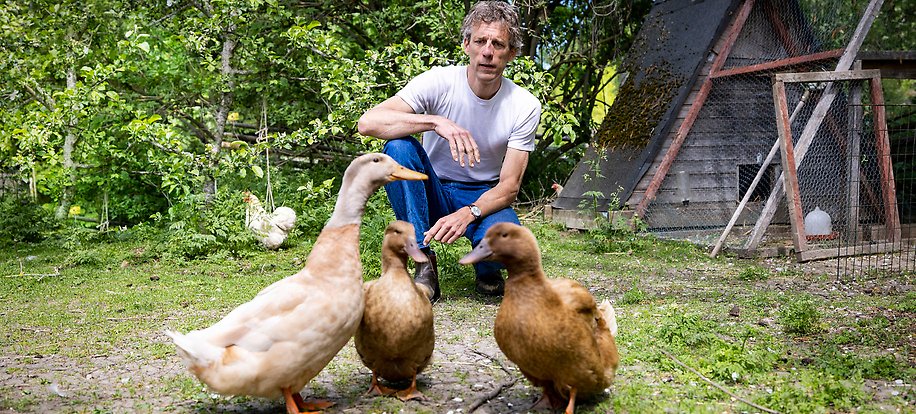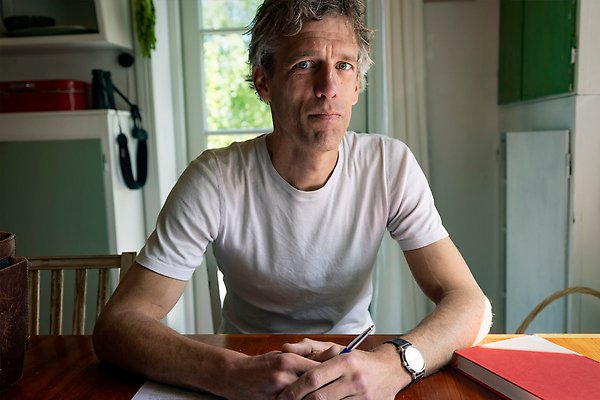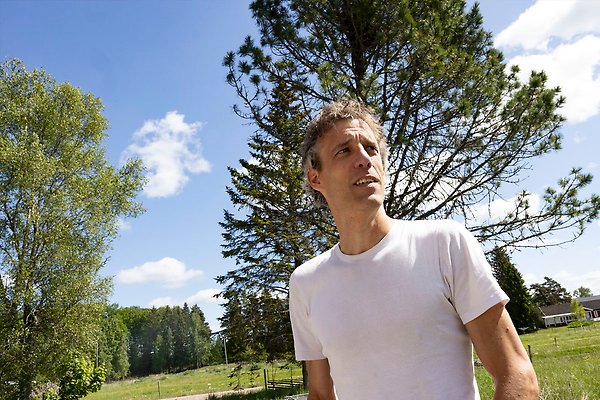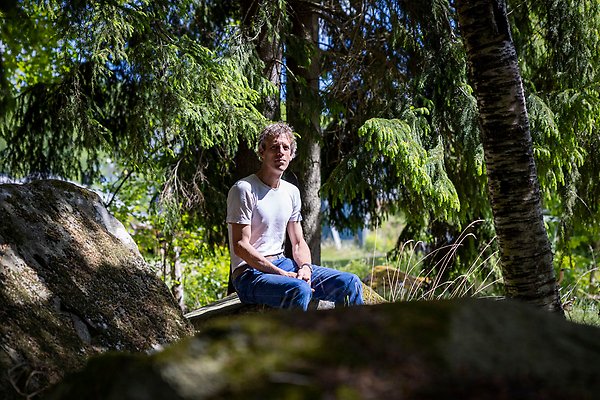Can we transition to a society that respects biodiversity?

How we interact with nature crucially influences how we understand and impact biodiversity, says Wijnand Boonstra. Photo: Mikael Wallerstedt
Scientists have long warned that the depletion of species and the limits of the world’s ecosystems are approaching a tipping point. We also know that the problem lies in how we produce and how we consume. Why is it so difficult to reverse the trend and promote biodiversity?
“We need different measures of success than perpetual economic growth. But the really big obstacles to overcome are the forces that drive overconsumption and waste, our limited human perspective and our habits,” says Wijnand Boonstra, researcher in natural resources and sustainable development.
Research shows that up to one million species are under threat of extinction within the next decade. The principal reasons are humanity’s increased use of the land for agriculture, forestry and urbanisation; the exploitation of animals and vegetation in the form of hunting and fishing; and climate change, pollution and the emergence of invasive alien species. Human survival is also threatened by the lack of diversity between, and within, species and ecosystems according to a 2019 evaluation report by the UN-connected Intergovernmental Science-Policy Platform on Biodiversity and Ecosystem Services (IPBES).
One of the members of IPBES is Uppsala researcher Wijnand Boonstra. He and close to 200 researchers are now working on the platform’s next report. In it, Wijnand Boonstra summarises studies by other researchers of the obstacles and challenges for transformative societal changes.
“Transformative societal changes occur on two levels. On the one hand, there is the individual level, where people themselves change their lifestyles, behaviours and habits. And on the other there is the societal level, in the form of systemic changes. At the societal level, there must be changes in our laws, institutions and organisations – in short, changes in the values we learn and into which we are socialised as children but also how we distribute and share environmental goods and services.”

Wijnand Boonstra, researcher in natural resources and sustainable development at the Department of Earth Sciences, Uppsala University. Photo: Mikael Wallerstedt
The dilemma lies in revising the institutions and perspectives we have grown accustomed to. This is always difficult, but a particular challenge for high-income countries in the world, notes Wijnand Boonstra. This is because their impact on biodiversity is so much greater than that of low-income countries.
“It makes high-income countries morally and ecologically obliged to limit their consumption and share power more equally. Therefore, the biggest change must come from these countries.”
Social systems with a different relationship to nature
The research for the upcoming IPBES assessment on transformative change considers examples of societies in our history that have succeeded in combining a comfortable life with a significantly smaller environmental footprint. In his own research, Wijnand Boonstra has studied contemporary farmers and fishermen who work with less modern methods, or are satisfied with lower rates of production. Farming and fishing styles that, from the perspective of modern agronomy or economics, would be regarded as underdeveloped or perhaps marginal.
“But studies have now shown that many of these less intensive forms of agriculture and fisheries have many positive side effects, including the conservation of biodiversity on land or in coastal areas. Some of these more modest and prudent ways of living with nature still exist today and we can learn from them.”

Less intensive forms of agriculture and fisheries have many positive side effects, including the conservation of biodiversity, says Wijnand Boonstra. Photo: Mikael Wallerstedt
But during human history, the groups and communities that managed to avoid overusing nature have always been relatively small, according to Wijnand Boonstra. Because these groups maintained face-to-face relationships that could be very effective in monitoring and controlling one another, as Nobel laureate Elinor Ostrom describes in her work.
“You can point out if your neighbour takes too much of the commons, and people often respect those norms when people are equals, know and depend on one another. But if you live in very large global and unequal societies like ours, it’s harder to get this kind of control and norm-setting to work. Seen in the light of human history, it is a radical new challenge to set limits in a democratic way at the scale of a global society,” says Wijnand Boonstra.
New basis for decision-makers
Recently, he participated in an IPBES meeting via video link with various groups of authors – the penultimate reporting meeting before the final report to be submitted in September 2024. After an external revision of the first draft, work is now under way on a second draft.
“While I am not permitted to provide any information on the content at this time, I can say that transformative change to conserve biodiversity requires far-reaching changes in individual choices and habits, and in the institutions and organisations in which we grow up, especially in industrialised countries in the world.”

The limited human perception of time makes it hard to maintain a long-term perspective on changes in biodiversity, says Wijnand Boonstra. Photo: Mikael Wallerstedt
But now that we’ve realised the need and urgency to act, why is change so slow? There are several reasons notes Wijnand Boonstra, but an important factor is our limited perception of time as humans.
“The decline in biodiversity often occurs gradually, which makes it hard for us to register the changes. Moreover, our perception of what we consider to be normal also shifts along with this decline. We often have an idea of the diversity of nature and society that is no longer than one generation ago. This is called the shifting baseline syndrome, and it makes it hard to maintain a long-term perspective on changes in biodiversity. That’s why we need to continuously do the global assessments that the IPBES is doing.”
Another barrier to transformative change is how the idea of never-ending economic growth is allowed to steer economic policy and is described in positive terms in the media, he adds.
“This idea persists because it benefits the powerful people and organisations in this world, but I think that it is naïve, dangerous and unjust to use it as a blueprint for connecting human societies to the biosphere and the basis for life.”
Aneli Björkman
Facts about IPBES
The Intergovernmental Science-Policy Platform on Biodiversity and Ecosystem Services (IPBES) is an intergovernmental organisation which was established in 2012. The Platform is intended to play a similar role to the UN’s Intergovernmental Panel on Climate Change (IPCC). IPBES assesses the state of the planet’s biodiversity, ecosystems and their importance for human well-being, and produces knowledge about effective policy strategies for decision-makers around the world. In May 2019, IPBES presented its first comprehensive report on the state of the planet’s biodiversity and ecosystem services. The report on transformative change will be published in September 2024.
